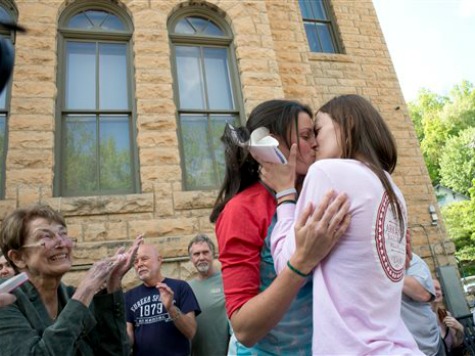EUREKA SPRINGS, Ark. (AP) — Two women were married on a sidewalk outside a county courthouse in Arkansas on Saturday, breaking a barrier that state voters put in place with a constitutional amendment 10 years ago.
A day after Pulaski County Circuit Judge Chris Piazza said the ban was “an unconstitutional attempt to narrow the definition of equality,” Kristin Seaton, 27, and Jennifer Rambo, 26, exchanged vows at an impromptu ceremony, officiated by a woman in a rainbow-colored dress.
The couple had spent the night in their Ford Focus after traveling to Eureka Springs from their home at Fort Smith, and was the first of about 10 couples to line up outside of the courthouse before it opened.
“Thank God,” Rambo said after Carroll County Deputy Clerk Jane Osborn issued them a license, ending a brief period of uncertainty when a different deputy county clerk said she wasn’t authorized to grant one and questioned whether Piazza’s order in a courtroom 150 miles away had any bearing in Eureka Springs.
Piazza ruled Friday that Arkansas’ 2004 voter-approved amendment to the state constitution violates the rights of gay couples, clearing the way for the first same-sex marriage in a traditional southern state. He didn’t put his ruling on hold as some judges in other states have done.
That caused confusion among the state’s 75 county clerks, said Association of Arkansas Counties executive director Chris Villines. He said Piazza should have issued a stay, just to avoid Saturday’s scramble.
“The court didn’t give us any time to get the kinks worked out,” Villines said.
Attorney General Dustin McDaniel said he would appeal the ruling and asked it be suspended during that process. No appeal had been filed as of Saturday morning when the license was issued.
Jerry Cox, president of the Arkansas Family Council, which promoted the gay-marriage ban in 2004, said Piazza’s decision to not suspend his ruling will create confusion if a stay is issued later.
“Are these people married? Are they unmarried?” Cox said. “Judge Piazza did a tremendous disservice to the people of Arkansas by leaving this in limbo.”
Arkansas’ amendment was passed in 2004 with the overwhelming support of Arkansas voters. Piazza’s ruling also overturned a 1997 state law banning gay marriage.
“The exclusion of a minority for no rational reason is a dangerous precedent,” he wrote.
The U.S. Supreme Court last year ruled that a law forbidding the federal government from recognizing same-sex marriages was unconstitutional. Since then, lower-court judges have repeatedly cited the decision when striking down some of the same-sex marriage bans that were enacted after Massachusetts started recognizing gay marriages in 2004.
Federal judges have ruled against marriage bans in Michigan, Oklahoma, Utah, Virginia and Texas, and ordered Kentucky, Ohio and Tennessee to recognize same-sex marriages from other states.
In all, according to gay-rights groups, more than 70 lawsuits seeking marriage equality are pending in about 30 states. Democratic attorneys general in several states — including Virginia, Pennsylvania, Nevada, Oregon and Kentucky — have declined to defend same-sex marriage bans.
Arkansas’ ruling came a week after McDaniel became the first statewide elected official to announce he personally supports gay marriage rights. But he said he would continue to defend the constitutional ban in court.
Aaron Sadler, McDaniel’s spokesman, said Friday the attorney general sought the stay because “we know that questions about validity of certain actions will arise absent a stay.”
Gay marriage is legal in Maryland, Delaware and the District of Columbia. Though technically considered southern states by the U.S. Census, they were not part of the old Confederacy, like Arkansas.
___
Associated Press writers Kurt Voigt in Eureka Springs and Andrew DeMillo in Little Rock contributed to this report.
___
Follow Christina Huynh on Twitter at –www.twitter.com/ckhuynh

COMMENTS
Please let us know if you're having issues with commenting.